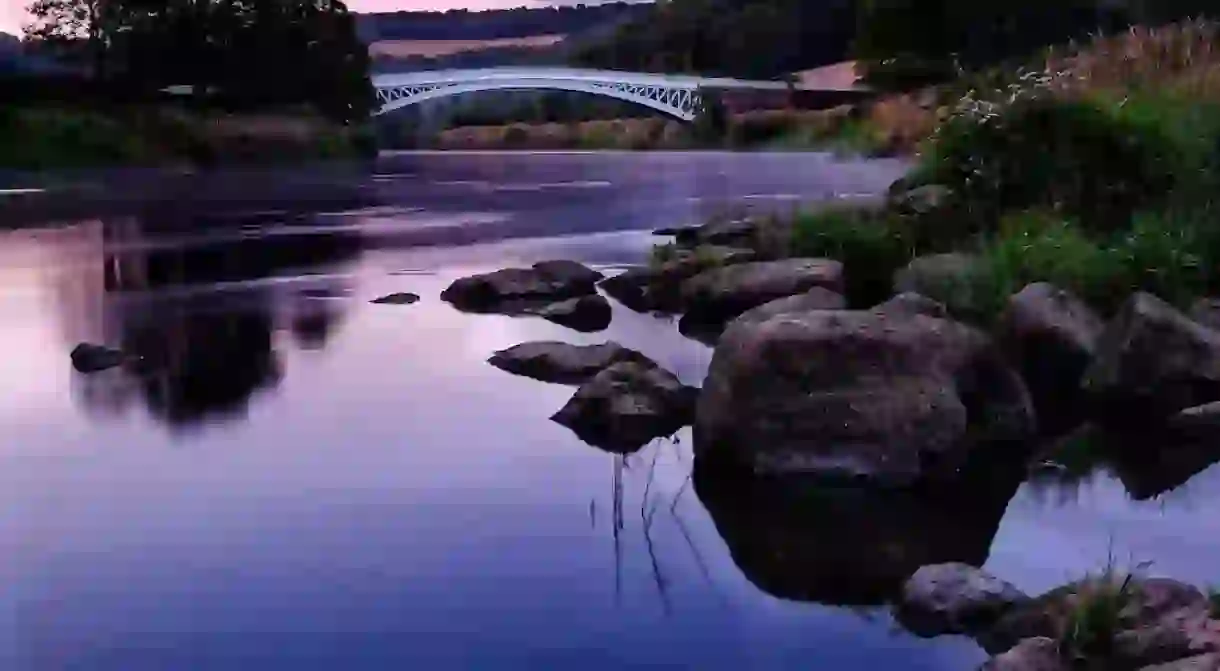The 10 Best Things to See and Do in Monmouthshire and Wales' Wye Valley

One of the UK’s first tourist areas, with the earliest guided tours taking place in the 18th century, Monmouthshire in South Wales is a beautiful county of rolling hills and gentle valleys. The River Wye flows alongside its eastern boundary and the Lower Wye Valley offers some seriously breathtaking scenery. Ideally located with easy access to the motorway network, visitors can enjoy a weekend break or a longer extended trip in one of Wales’ most fascinating counties. With so much on offer, here’s our guide to making the most of your visit with our 10 favourite things to see and do.

Tintern Abbey
Built by French Cistercian monks in the 12th century, Tintern Abbey sits regally on the riverbank. Exceptionally beautiful by day or night, this world-famous ruin is in the care of Welsh heritage trust Cadw and, at certain times of the year, the full moon rests behind the abbey’s central window allowing for a photo opportunity like no other.
Canoeing on the River Wye
There is no better way to explore the hidden Wye Valley than by boat. There are several canoe hire centres in the area. A Canadian canoe trip down the peaceful river in summer makes for excellent memories, but be warned – there are a few rapids, however these only add to the thrill!

Rock climbing at Wyndcliff
For the adrenaline junkies among us, the Lower Wye Valley offers some seriously cool rock climbing. One of the most popular sites is at Wyndcliff, a few minutes from Chepstow. The sheer cliff face is a real challenge while far below the river flows gently by, allowing for some incredible views once you reach ‘The Eagle’s Nest’ at the top.
A day at Chepstow Races
Wales’ most famous racecourse and home to the Welsh Grand National, Chepstow Racecourse offers some seriously nail-biting entertainment, whether you enjoy a flutter or just want to absorb the lively atmosphere, a day at the races is well worth including on that Wye Valley bucket list.
The Monnow Bridge
Market, Bridge, Market
Built to defend the border town of Monmouth during the 13th century, the fortified Monnow Bridge is the last one of its kind in the country. Its design emphasises the importance of this sleepy market town because its location, and relatively easy accessibility, made it a target for attack throughout the medieval period.
The Kymin Roundhouse
Built as a dining room by one of Monmouth’s landed families, the Roundhouse looks down on the town from the top of the Kymin hill. Built in the later 18th century, Horatio Nelson himself dined within this little folly. Now in the care of the National Trust, it is open to visitors and affords outstanding views across the county and beyond.
Chepstow Castle
One of the earliest Norman castles in Wales, Chepstow sits high on a cliff overlooking the River Wye, with views across the Severn Estuary. The current ruined structure is the legacy of the infamous Marshall family. William Marshall was one of the most famous knights in Medieval England. Certainly majestic, you should allow at least half a day to explore this most illustrious of Welsh castles.
The Nelson Museum, Monmouth
Market, Market, Museum
This small but perfectly formed museum holds a collection of Nelson memorabilia, gifted in the early 20th century by local aristocrat Lady Llangattock – who seems to have had a bit of a crush! A great place to start exploring the region, with some interesting local exhibits which really help visitors to immerse themselves in the history of this unique border market town.
Tintern Old Station
Tea Room
Once part of the Wye Valley Railway, The Old Station at Tintern is now a visitors centre. There are old carriages to explore, an excellent tea room and several marked trails – so whether you fancy a quick stroll, a family-friendly walk or something a little more challenging, the Old Station will provide.
Bigsweir Bridge
Bridge
As the River Wye follows the English/Welsh border, travellers between Monmouth and Chepstow will find themselves crossing it several times on their journey. Bigsweir Bridge, built in the early 19th century, is an elegant example of Georgian architecture and spans the river taking visitors over the border. The fisheries surrounding the bridge are internationally renowned and during the salmon season there are dozens of fisherman to be found alongside the riverbank enjoying the outstanding vista.













